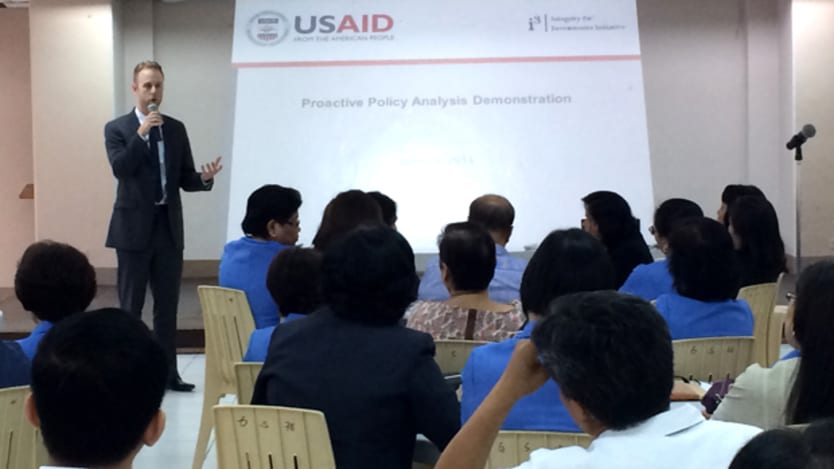Development done differently: Making better decisions with proactive policy analysis

Policymakers’ decisions are influenced by a variety of factors: public opinion, elections, interest groups and current events. In this highly dynamic environment of policy development, however, one important influence is sometimes absent: evidence.
Even with the best intentions in mind, when policymakers lack the proper analytical tools to inform their decisions and evaluate options, the resulting policy can be costly or even harmful.
There are countless alarming examples of the outcomes of misguided analysis in action. Misinformed policies about the relationship between HIV and AIDS contributed to a lack of support for proper medical treatment, which resulted in more than 3,000 preventable deaths in South Africa in the early 2000s. Three decades of education policies and investments intended to remove barriers to education have failed to achieve their goals: 58 million children around the world are still not attending school.
In short, without the proper tools to evaluate policy impacts, policymakers are often poorly positioned to make smart policy reforms. But there is some momentum for change.
Pushing for more evidence
Evolving perspectives about evidence-based policymaking have created a new impetus to make more informed decisions. From governmentwide efforts in the United Kingdom in the late 1990s to U.S. President Barack Obama’s current evidence-based social policy initiatives, the pressure to use rigorous evidence to inform policy decisions is increasingly common.
Yet even with the development of new frameworks and aggregation of relevant data, few governments have the practical tools at their disposal to incorporate evidence into policy decisions and discussions in an efficient, effective and accurate way.
But what if there was a tool that enabled policymakers to quickly and easily determine the potential impact of their policy decisions? Imagine that instead of reading a static report scoring a piece of legislation, policymakers could easily adjust key data inputs — such as the number of people covered by a provision — and immediately ascertain the effect on performance outcomes and costs. By doing this, policymakers could also anticipate risks associated with key provisions and make modifications to mitigate these risks.
A policymaking tool that offers these capabilities and brings evidence into the conversation would be a dramatic game changer, particularly in resource-constrained countries with less room for politically driven error.
Changing the game by empowering policymakers
In 2013, news outlets in the Philippines reported that up to 3 percent of gross domestic product had been embezzled by the country’s political officials. When government authorities were faced with the challenge of formulating a policy response to combat this level of endemic corruption, the U.S. Agency for International Development’s Integrity for Investments project used Deloitte Consulting LLP’s Proactive Policy Analysis — or PPA — approach to advance the way leaders in the country approached policy creation and implementation.
After several meetings to identify key assumptions, gather data and hone in on the objectives of the proposed policies, the project team used the PPA methodology to develop a customized tool for the Philippine government to analyze, quantify and visualize potential impacts from implementing proposed anti-corruption legislation.
Over two months, Filipino government leaders applied PPA to a series of proposed anti-corruption legislative packages to project and analyze a range of impact scenarios in real time.
See more stories from Deloitte Consulting LLP:
● A new paradigm for capacity development
● Development done differently: A call to action for donors and local institutions
● Forget capacity development — focus on sustainable performance improvement
According to the deputy ombudsman and chairman of the legislative team, “the PPA tool has helped the Office of the Ombudsman — the Philippines’ constitutional anti-corruption agency — present to senators and [representatives] in a visually compelling and persuasive way how support for the anti-corruption legislative initiatives can generate concrete economic and development gains for the country, and improve perceptions of government anti-corruption efforts.”
Leaders in the executive branch used the analysis during conversations with congressional staffers to demonstrate in real time the expected impact of various combinations of policies. For the first time, legislators were able to prioritize the introduction of legislation based on what was most likely to achieve desired outcomes. In a few years, after policy implementation, leaders will be able to evaluate the magnitude of change in key outcome measures.
The government of the Philippines has since expanded the use of PPA to other areas, including succession planning policy for a major executive branch organization.
Creating a ‘new normal’
Tough policy contexts, like fighting corruption, demand powerful, evidenced-based arguments to translate evidence to decisions to balance the many other factors driving policy creation.
Other important social issues like health, gender and education require compelling ways to understand existing data and demonstrate the power of prevention and long-term investment.
Existing policy frameworks and databases certainly build capacity and create the potential to change the policy development process. But history tells us this isn’t enough. In the development community, we need to go one step further and move from potential to performance.
Practical tools like the PPA methodology can be the sort of game changers the development community needs to transform policy frameworks and databases into positive policy impacts.
This is the second of three sponsored guest columns that explore how sustainable performance improvement, counterpart empowerment and data-driven choices are driving a transformation in the way development is being done.
Back in November, Deloitte and Devex collaborated in an exclusive webinar to discuss what the global development community has learned so far and how to create the environment for sustainable performance improvement.
Join the Devex community and access more in-depth analysis, breaking news and business advice — and a host of other services — on international development, humanitarian aid and global health.
Search for articles
Most Read
- 1
- 2
- 3
- 4
- 5


